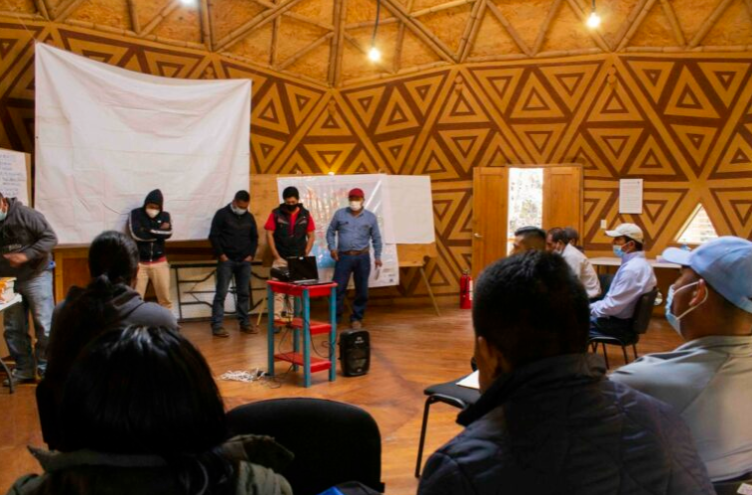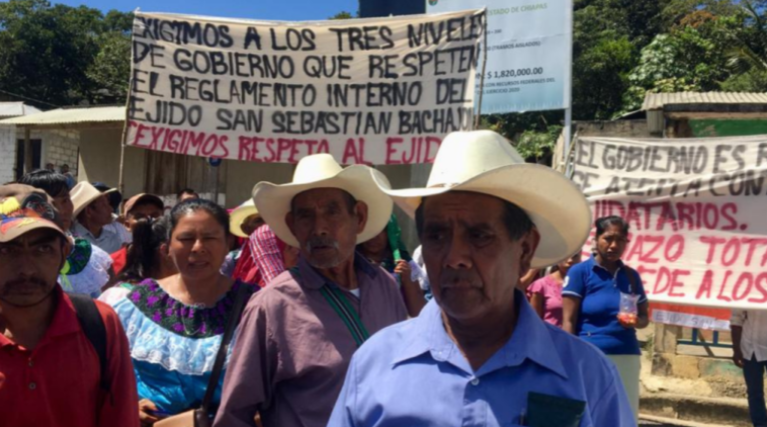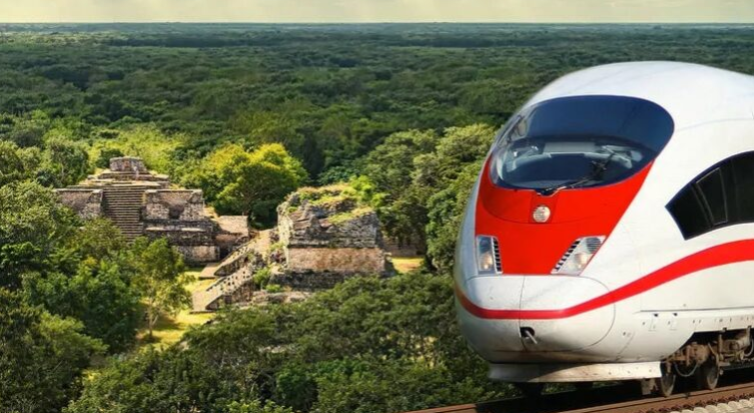By Yéssica Morales

**Tzeltal Indians from 45 communities in the municipality of San Juan Cancuc declared themselves opposed to the “Highway of Cultures,” which will connect San Cristóbal de Las Casas and Palenque, as they said it will not benefit them, but will result in the dispossession of their lands and sacred spaces.
Representatives of Zoque, Tseltal, and Tzotzil agrarian centers of Chiapas rejected megaprojects inside of their territories, this in the context of the “Third Gathering of the Popular Ejidal1 and Communal School,” on account of the fact that capitalism, transnational companies and governments continue to promote mechanisms to deepen the extractive model.
They added that, with the megaprojects, they intend to dispute the territories of indigenous peoples by way of violence, repression, plunder, displacement, and criminalization of their peaceful resistances in defense of land and territory.
The representatives demanded that the displaced people of Los Chorros of the Rio Jordán in the municipality of Chenalhó would not be evicted when they return on April 28th of this year; that their ways of organizing be respected without imposition; and that they are guaranteed to be able to work freely on their lands.
They denounced the lack of commitment and responsibility on the part of the local and State governments in preventing repression and impunity, as in that which occurred on October 15, 2020 in Chilón, when police put down a demonstration of campesinos and indigenous Tseltales who were protesting against the construction of a National Guard unit (GN).
Three indigenous people were detained, and several others wounded, and for its part, the military forces remained guarding the zone during the protest containment operation.
Similarly, they denounced the incompetence of the state government in guaranteeing governance, as well as the violation of collective, individual and human rights committed against indigenous peoples and defenders of Human Rights and territory.
As well as the harassment, threats and actions of the local government that try to discredit those who defend life and territory.

They demanded the liberation of political prisoners like César Hernández Feliciano and José Luís Gutiérrez Hernández, who were detained and charged with a rioting offense, for their participation in the protest of the construction of the National Guard barracks.
It is worth mentioning that the Fray Bartolomé de las Casas Center for Human Rights (Frayba) announced that the resident Supervisory Judge in the municipality of Cintalapa de Figueroa, determined that the community defenders will continue their criminal process by appearing periodically before the Supervisory Court of Ocosingo, and that they are prohibited from leaving the country or the established territorial area without authorization.
In addition to the above, they asked for the reparation of damages suffered as a result of the repression and the favorable resolution of the injunctions of the ejidatarios of San Jerónimo Bachajón.
We defend life, human rights, the rights of collectives, of indigenous peoples, the rights of nature, our forests, our rivers, the water, biodiversity, our cultures, but also our right to free self-determination as indigenous peoples. We claim our right to decide about our present and our future based on our internal normative processes and not through political parties that bring us violence and community and family division
– Representatives to the 3rd Popular Ejidal and Communal School
Finally, they rejected the construction of the super Highway of the Cultures from San Cristóbal de Las Casas to Palenque, the mining projects, the dozens of hydroelectric projects, the militarization, as well as the presence of the National Guard, or through the imposition of the ejidal authorities in order to favor the installation of headquarters in agrarian centers.
Resistances against Megaprojects

Photo: Sebastián Terfloth/Salva selva.
Women and men members of ejidos, community members from diverse regions of Chiapas together with the Popular Ejidal and Communal School, gathered in the Alter Natos Ecological Center from the 20th-23rd of 2020 to analyze the situation of their agrarian centers that are being challenged by various megaprojects* that threaten their Ejidos and Communal Properties.
Agrarian authorities demanded that in Oxchuc they accelerate the process of changing authorities of communal properties through the “raised hand” of the 132 communities who respect traditional uses and customs2, since their rights as community members have been violated at the ballot box.
They denounced that they had exhausted the means of appealing to agencies, such as the Agrarian Attorney’s Office and the National Agrarian Registry, without response.
They demanded the liberation of the ejido members César Hernández Feliciano y José Luis Gutiérrez Hernández arbitrarily detained during a peaceful protest at the Temó Crossroads in Chilón.
The agrarian authorities demanded of the Municipal President of Chilón that he respect the rights and autonomy of the General Assembly of the ejido and the immediate cancellation of the construction of the National Guard Headquarters, as well as the recognition of the commissioner Vicente Silvano Gutiérrez of the Ejido San Jerónimo, Bachajón.
On the other side, the Voice of the People of the Coastal Plains and Mountains of Chiapas rejected the construction of dams and mines in the region, and similarly demanded respect for the territories of the agrarian centers of the region, and the cancellation of the super highway that will cross territories of agrarian centers in San Juan Cancuc, among others.
*Mining projects, dams, super highways, oil wells, fracking, gas pipelines, oil palm plantations, airports, maritime ports, the Mayan Train, the InterOceanic Canal, refineries, among others.
This article was originally published in ChiapasParalelo on April 19, 2021. https://www.chiapasparalelo.com/noticias/chiapas/2021/04/zoques-tseltales-y-tsotsiles-rechazan-megaproyectos-por-temor-a-violencia-despojo-y-desplazamiento/ This English interpretation has been republished by Schools for Chiapas.
Footnotes
- Ejidos are tracts of land set aside under Article 27 of Mexican constitution of 1917, for communal agriculture in which members have usufruct land rights. Finally implemented under Lázaro Cardenas in 1934, the article made sweeping agrarian reform which transformed the Mexican countryside.
- Uses and customs, usos y costumbres, refers to traditional forms of indigenous community governance and cultural practices relating to social organization.
